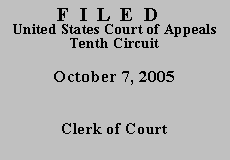

| PHILIP M. BONAN,
v.
JAMES KEITH, and THE
ATTORNEY GENERAL OF THE
STATE OF COLORADO |
No. 05-1104
(D.C. No. 04-Z-2123) (D. Colo.) |
Bonan was convicted of four counts of sexual assault of a child by a person in a position of trust. He was sentenced to consecutive prison terms that totaled forty years. He filed two direct appeals, the second of which became final when the Supreme Court denied a writ of certiorari on August 4, 1995. Three years and one day later, on August 5, 1998, Bonan filed the first of three motions for state collateral relief. All three motions were denied.
Bonan filed a § 2254 petition in the court below on September 24, 2004. In response to a order to show cause, Bonan argued that the doctrine of equitable tolling justified his delay in filing his habeas petition. The court below concluded that Bonan's habeas petition was time-barred and dismissed. Failing to secure a COA from that court, Bonan now seeks a COA from this court.(*)
The statute of limitations for applications for a writ of habeas corpus is set forth in 28 U.S.C. § 2244(d). It states:
(1) A 1-year period of limitation shall apply to an application for a writ of habeas corpus by a person in custody pursuant to the judgment of a State court. The limitation period shall run from the latest of
(A) the date on which the judgment became final by the conclusion of direct review or the expiration of the time for seeking such review;
(B) the date on which the impediment to filing an application created by State action in violation of the Constitution or laws of the United States is removed, if the applicant was prevented from filing by such State action;
(C) the date on which the constitutional right asserted was initially recognized by the Supreme Court, if the right has been newly recognized by the Supreme Court and made retroactively applicable to cases on collateral review; or
(D) the date on which the factual predicate of the claim or claims presented could have been discovered through the exercise of due diligence.
(2) The time during which a properly filed application for State post-conviction or other collateral review with respect to the pertinent judgment or claim is pending shall not be counted toward any period of limitation under this subsection.
Because this law went into effect on April 24, 1996, after Bonan's conviction became final, Bonan had until April 24, 1997 to file his petition. See United States v. Hurst, 322 F.3d 1256, 1260 (10th Cir. 2003).
Equitable tolling "is only available when an inmate diligently pursues his claims and demonstrates that the failure to timely file was caused by extraordinary circumstances beyond his control." Marsh v. Soares, 223 F.3d 1217, 1220 (10th Cir. 2000). Under 28 U.S.C. § 2244(d)(2), the time during which a properly filed application for state post-conviction relief or other collateral review is pending does not count towards the one-year statute of limitations. However, Bonan did not file his first Colo. R. Crim. P. 35(c) motion until August 5, 1998, over one year after the statute of limitations had run. Bonan argues that he was conducting research about the facts of his case during this period. That he spent three years from the date his conviction was finalized to the date he filed his first petition for state collateral review conducting research unimpeded by circumstances beyond his control only proves that he is not eligible for equitable tolling. Bonan's petition is therefore time-barred.
For the reasons set forth above, Bonan's request for a COA is DENIED and the appeal is DISMISSED. Appellant's motion to proceed in forma pauperis is granted.
ENTERED FOR THE COURT
Carlos F. Lucero
Circuit Judge
*. Bonan's petition was filed after April 24, 1996, the effective date of the Antiterrorism and Effective Death Penalty Act ("AEDPA"); as a result, AEDPA's provisions apply to this case. See R ogers v. Gibson, 173 F.3d 1278, 1282 n.1 (10th Cir. 1999) (citing Lindh v. Murphy, 521 U.S. 320 (1997)). AEDPA conditions a petitioner's right to appeal a denial of habeas relief under § 2254 upon a grant of a COA. 28 U.S.C. § 2253(c)(1)(A). A COA may be issued "only if the applicant has made a substantial showing of the denial of a constitutional right." § 2253(c)(2). This requires Bonan to show "that reasonable jurists could debate whether (or, for that matter, agree that) the petition should have been resolved in a different manner or that the issues presented were adequate to deserve encouragement to proceed further." Sla ck v. McDaniel, 529 U.S. 473, 484 (2000) (quotations omitted). Because the district court denied Bonan a COA, he may not appeal the district court's decision absent a grant of COA by this court.